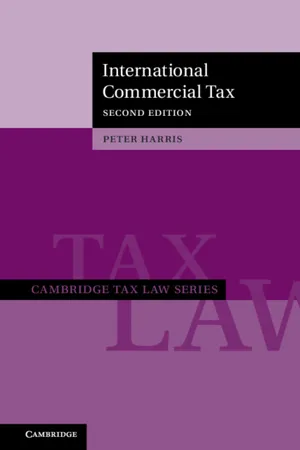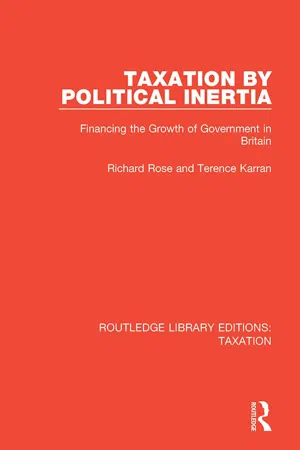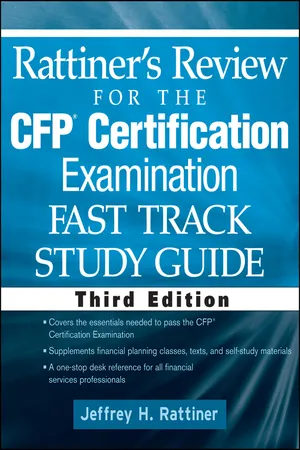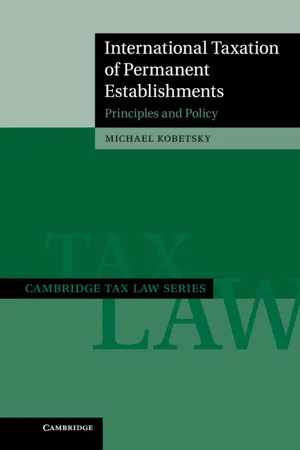Law
Tax Law
Tax law refers to the body of legal rules and regulations that govern the assessment and collection of taxes. It encompasses various aspects such as income tax, property tax, and corporate tax. Tax laws are designed to ensure compliance with tax obligations and to regulate the administration and enforcement of tax policies within a jurisdiction.
Written by Perlego with AI-assistance
Related key terms
1 of 5
8 Key excerpts on "Tax Law"
- No longer available |Learn more
- Stephan Leimberg, Michael S. Jackson, Jay Katz, John J Scroggin, Robert S Keebler(Authors)
- 2020(Publication Date)
- The National Underwriter Company(Publisher)
SOURCES OF INCOME Tax Law FUNDAMENTALSCHAPTER 1Clearly anyone who has prepared a tax return or dealt with tax issues realizes that the federal income Tax Laws can be hard to comprehend and difficult to apply. The sheer number of tax provisions and their complexity can be somewhat daunting. Even the IRS, the nation’s tax collection agency, acknowledges that “for anyone not familiar with the inner workings of tax administration, the array of IRS guidance may seem, well, a little puzzling at first glance.”1 Since Albert Einstein expressed his concern that Tax Laws were among the most complex of all human tasks, this statement by the IRS could be one of the great understatements of all time!Yet, all tax professionals as well as financial planners must have a good general working knowledge of the Tax Laws in order to effectively assist clients. This chapter identifies the sources of federal Tax Law, the relative importance of each federal Tax Law source, and how to identify a source by its citation.Obviously, federal Tax Law begins with the Internal Revenue Code (Code), a codification of tax statutes enacted by Congress. As discussed later in the chapter, the IRS and the Treasury Department promulgate regulations interpreting the Code providing guidance to taxpayers who are required to comply with the Tax Law. Regulations generally have the force of law. Disputes between the IRS and taxpayers are often litigated. Although the binding effect of judicial decisions varies with the level of the court, judicial interpretation of Tax Law is often impactful. Finally, on a less formal basis, the IRS issues revenue ruling, revenue procedures and other pronouncements that provide additional guidance for taxpayers. Although this type of guidance lacks the force and effect of law, it provides useful help to taxpayers.Additionally, legislative history and tax publications are also helpful secondary authorities that offer explanations and interpretations of the Tax Law. Although these sources are not binding, they are helpful tools to assist the taxpayer. - eBook - ePub
- Victor Thuronyi(Author)
- 1996(Publication Date)
- INTERNATIONAL MONETARY FUND(Publisher)
The often broad way in which U.S. tax courts interpret the Tax Law should be contrasted with the very close style of legal drafting used in the Internal Revenue Code, which prima facie obliges the courts to make decisions on very narrow rules. In spite of this, U.S. courts stick to their judicial doctrines, probably because of the common law tradition of legal analysis, where interpreting facts and rules with common sense plays an important role.I. Antiabuse Legislation
Closely connected with the problems of interpretation of Tax Laws are statutory measures introduced to provide general rules for the application of tax legislation in situations where taxpayers structure transactions in a peculiar legal form so as to obtain a tax benefit unintended by the Tax Law. Tax Laws being general prescriptions, it is inevitable that the legislator cannot foresee all situations in a rapidly changing world, thereby leaving gaps and loopholes in any Tax Law.137 Also, in many cases, the Tax Law allows the taxpayer a choice between different legal alternatives to reach factual objectives that are identical or very similar, but with different tax consequences. Depending on the legal choice made by the taxpayer, the same factual objective will result in a lower or higher tax burden. The two basically related questions raised here for the application and interpretation of the Tax Law are (1) what are the respective roles of the legislator and the courts in filling the gaps and loopholes, and (2) should the Tax Law attach different tax consequences to different legal situations that result in the same or a very similar factual situation?The answer to these two questions may be clearer if the so-called antiabuse legislation is considered in the wider context of tax evasion and tax avoidance. In practically all developed tax systems, a distinction is made between tax evasion and tax avoidance. Tax evasion or tax fraud138 - eBook - PDF
- Peter Harris(Author)
- 2020(Publication Date)
- Cambridge University Press(Publisher)
21 1.2 Sources of International Tax Law and Their Interrelationship The discussion now moves from the general consideration of income tax fundamentals to the sources of international Tax Law. 1.2.1 Domestic Law The charge to tax is inevitably found in the domestic law of each country. As mentioned, in the UK the charge to direct taxation is typically found in the annual Finance Act, which also sets the rates at which tax is charged. Separately, there are various integrated laws setting out how that charge is calculated. Historically, the UK system was relatively straightforward with all persons being subject to income tax and a single law governing the calculation. Leaving aside Profits Tax and its predecessors, things became slightly more complex with the introduction of corporation tax in 1965, which largely replaced the income tax charge on corporations. Corporation tax and income tax were merged into a single law in 1970, although there was a separate law governing capital gains, which also dated from 1965, and a separate tax administration law, dating from the 1870s. The Tax Law rewrite that began in the 1990s substantially complicated this situation by fragmenting the single law. The income tax is now divided between three laws. 22 Similarly, the corporation tax is divided between two laws dating from 2009 and 2010. 23 In addition, these laws are supplemen- ted with three laws that apply to both individuals and corporations. 24 21 Generally regarding the historic distinction between direct and indirect taxes, see Harris (2006, 30–1) and the references cited therein. 22 Income Tax (Earnings and Pensions) Act 2003 (UK), Income Tax (Trading and Other Income) Act 2005 (UK) (‘ITTOIA 2005’) and Income Tax Act 2007 (UK). 23 Corporation Tax Act 2009 (UK) (‘CTA 2009’) and Corporation Tax Act 2010 (UK) (‘CTA 2010’). - eBook - ePub
Taxation by Political Inertia
Financing the Growth of Government in Britain
- Richard Rose, Terence Karran(Authors)
- 2018(Publication Date)
- Routledge(Publisher)
Given a choice between acting according to a political or fiscal logic, politicians have no difficulty in following their political instincts and accepting the inertia of established taxes, whatever the logical arguments for making other decisions. If the political circumstances make inaction intolerable (Rose, 1972), then any policy – logical or contradictory – may appear acceptable to end an intolerable situation. If fiscal, social and other arguments imply major political benefits from a positive change in taxation, then action may follow. But this does not detract from the essential point, that the rationale must be political. As Richard Neustadt once remarked: ‘No President can have an economic policy; all his policies must be political.’Many LawsLaws, like taxes, are plural not singular. Just as a summary statistic of total tax revenue masks the variety of activities involved in collecting particular taxes, so a reference to Tax Law or the statutory basis of taxation makes tax legislation appear simpler than it is.Many Laws for Each TaxA tax is not normally calculated solely according to a single Act of Parliament; every tax is usually subject to conditions scattered among dozens of different laws. The official Index to the Statutes lists forty-six different Acts of Parliament affecting income and corporation taxes; thirty-four Acts for national insurance; and twenty-nine Acts for rates in England and Wales. Even taxes that raise relatively little money can be the subject of much legislation; 147 different Acts of Parliament affect the calculation of stamp duties, and eighty-six Acts concern death duties (Table 4. 1 ).In order to come to grips with tax legislation, one must survey hundreds of Acts of Parliament. A one-volume reference book for Tax Lawyers and accountants, Butterworths UK Tax Guide 1984–85 - Jeffrey H. Rattiner(Author)
- 2009(Publication Date)
- Wiley(Publisher)
CHAPTER 5INCOME TAX PLANNINGTOPIC 44: INCOME Tax Law FUNDAMENTALS
1. Sources of authoritya. Primary1. Statutory lawsa. Internal Revenue Code of 1986. The primary source of Tax Law b. Taxpayer Relief Act of 1997. Included more than 300 new provisions and 800 changes to the Internal Revenue Code of 1986c. Tax legislative process begins with the House Ways and Means Committee and later goes to the House of Representatives. If the House approves the bill, it is submitted to the Senate Finance Committee and then to the entire Senate. If approved with no changes, it goes to the president for approval or veto. If there are changes, the Joint Conference Committee will address them and submit the bill back to the House and Senate.2. Administrative pronouncementsa. Treasury regulations: The official interpretation of a statutory tax rule written and published by the U.S. Treasury; the highest source of authority next to the Internal Revenue Code. Treasury regulations have the full force and effect of the law.b. Revenue rulings: Represent the official position of the Internal Revenue Service (IRS), but carry less authority than the Code and regulations. They provide interpretations of the Tax Law and give guidance to taxpayers.c. Revenue procedures: These also represent the official position of the IRS. They are generally related to compliance matters such as tax tables, inflation-indexed amounts, asset class lives, and so forth.d. Letter rulings: More specific interpretations by the national office of the IRS related to the tax consequences of a contemplated transaction at the request of the taxpayer. A letter ruling is applicable only to the taxpayer who requested it and cannot be used by another taxpayer in a dispute.3. Judicial decisiona. Taxpayers can escalate any tax dispute to a regional appeals office of the IRS.b. If a case is unresolved, the taxpayer can take it to federal court for judicial review, consisting of three trial courts.(i) U.S. Tax Court: Refuse to pay deficiency; no jury trial (ii) U.S. District Court: Pay the deficiency and sue for a refund; provides a jury trial (iii) U.S. Court of Federal Claims: Pay the deficiency and sue for a refund; no jury trial- eBook - PDF
Drafting Legislation
Art and Technology of Rules for Regulation
- Helen Xanthaki(Author)
- 2014(Publication Date)
- Hart Publishing(Publisher)
However, this can lead to bizarre and confusing designations for sections. It is interesting to note the non-sequential numbering of the US Internal Revenue Code: this involves leaving a gap in section numbering between each division of the statute; if new sections are added, they can be named by using the unused section numbers. But of course this is of questionable effectiveness: what difference would it make to the user if the provision between 12 and 20 is designated as 13 or 12 bis? Taxation legislation is plagued with numerous and often clashing defini-tions introduced by the same or various legislative texts, the Interpretation Act or even court judgments. Moreover, taxation definitions tend to refer not only to the whole Act, but they are part or section specific. The problem of definitions in taxation legislation is so pronounced that they were one of the focuses of the Tax Law Rewrite Project. 27 The elements of a good taxation definition as identified by the OTS are: clarity; focus on essential features; the use of an existing definition where possible; avoidance of cir-cularity; avoidance of figurative or obscure language; and being affirmative rather than negative. 28 There is little to indicate that a tax drafter departs from good practices of drafting definitions in other fields of legislation: the only difference is that taxation legislation does not allow for mistakes. Difficult concepts require balancing between technical terms familiar to the practitioners 29 with simple language benefiting lay users. An index of tax definitions is considered a welcome innovation. 30 Perhaps a simplistic approach to the problem would be to invite the tax drafter to pitch the definition, and the language of the whole text, to the level of specialisation of the main bulk of users: personal income legislation calls for much simpler language when compared with corporation tax. - eBook - PDF
International Taxation of Permanent Establishments
Principles and Policy
- Michael Kobetsky(Author)
- 2011(Publication Date)
- Cambridge University Press(Publisher)
Countries apply their taxes on the basis of their residency jurisdiction and source jurisdiction, as an important part of a country’s tax base is the income from cross-border transactions. But the overlap of the tax jurisdictions of two or more countries over taxpayers or items of income may result in double taxation. To prevent double taxation countries enter into tax treaties, which are the international aspect of these countries’ Tax Laws. A tax treaty, in effect, modifies the domestic tax jurisdiction of the treaty countries to eliminate double taxation. Tax treaties play an important role in supporting international trade and investment and in allocating profits from international transactions which has resulted in developed countries having an extensive network of tax treaties with their main trading countries and neighbouring countries. 3.1 Domestic Tax Law A country will impose tax on cross-border transactions under its domestic law, and set the primary tax liability on these transactions. The domestic tax rules contain the definitions of terms used in the Tax Law, specify what types of income or taxpayers are to be assessed, set the rates of tax, and specify the requirements a taxpayer must comply with. Domestic Tax Law can provide relief from double taxation for residents through either a foreign tax credits system or an exemption system. Domestic Tax Law may also provide exemptions from taxation on certain types of income for non-residents, such as an exemption from non-resident interest withhold- ing tax. In theory, double taxation could be prevented by the coordinated use of full exemptions of income and capital gains from taxation, but, in practice, this degree of coordination is unlikely to be established through the exclusive use of domestic legislation. 142 3.2 Tax treaties Tax treaties are international agreements between countries and, although most of the agreements are bilateral, there are some significant regional multilateral tax treaties. - Nigar Hashimzade, Yuliya Epifantseva, Nigar Hashimzade, Yuliya Epifantseva(Authors)
- 2017(Publication Date)
- Routledge(Publisher)
Given the massive resource difference between tax justice advocates and the OECD member governments, it seems clear the latter will employ their well-resourced and highly motivated supporting constituencies to clear the way for OECD-based policy views to continue to prevail. This power difference must be acknowledged as real, even while it is vigorously protested as a fundamentally unjust way to decide how states can and should exercise taxation, and continuously countered with comprehensively justice-oriented policy alternatives. Starting from the premise that the status quo is a product of decades of soft law, a convincing case can be made that governments can and should contain the mechanisms for controlling inappropriate behaviour within the structure of law instead.Using law to constrain taxpayer behaviour
The line between avoidance and evasion, like many line-drawing exercises in tax or otherwise, is fraught with difficulties.46 It is a line that should be drawn not with soft law but with legal principles, continuously monitored and enforced through compliance with agreed upon rules and standards, backed up by judicial review, to put the taxpayers on notice as to the behavioural expectations applicable to all.This is not to say that governments are or should be helpless against formalistic or sophisticated tax planning.47 Governments are clearly not helpless in this regard: this is the point and purpose of anti-abuse rules. These may be bright-line rules, such as thin capitalization and beneficial ownership, or more flexible regimes that rely on weighing and balancing with judicial oversight as a backstop, such as general and specific anti-avoidance rules, sham and step transaction doctrines, and economic purpose tests.48 All of these are admittedly cumbersome ways to solve complex problems, but they are at least capable of collectively moving the tax system toward more coherence and consistency of application.In contrast, suggesting that the difference between illegal and legal cannot be established in law posits that while societies are incapable of articulating the parameters of acceptable conduct within the law, legal sanction will nevertheless be imposed for noncompliance. This implies that punishment can and will be meted out randomly, because judgments about taxpayer behaviour will be made outside of the sphere of deliberative lawmaking and instead in the court of public opinion.
Index pages curate the most relevant extracts from our library of academic textbooks. They’ve been created using an in-house natural language model (NLM), each adding context and meaning to key research topics.







